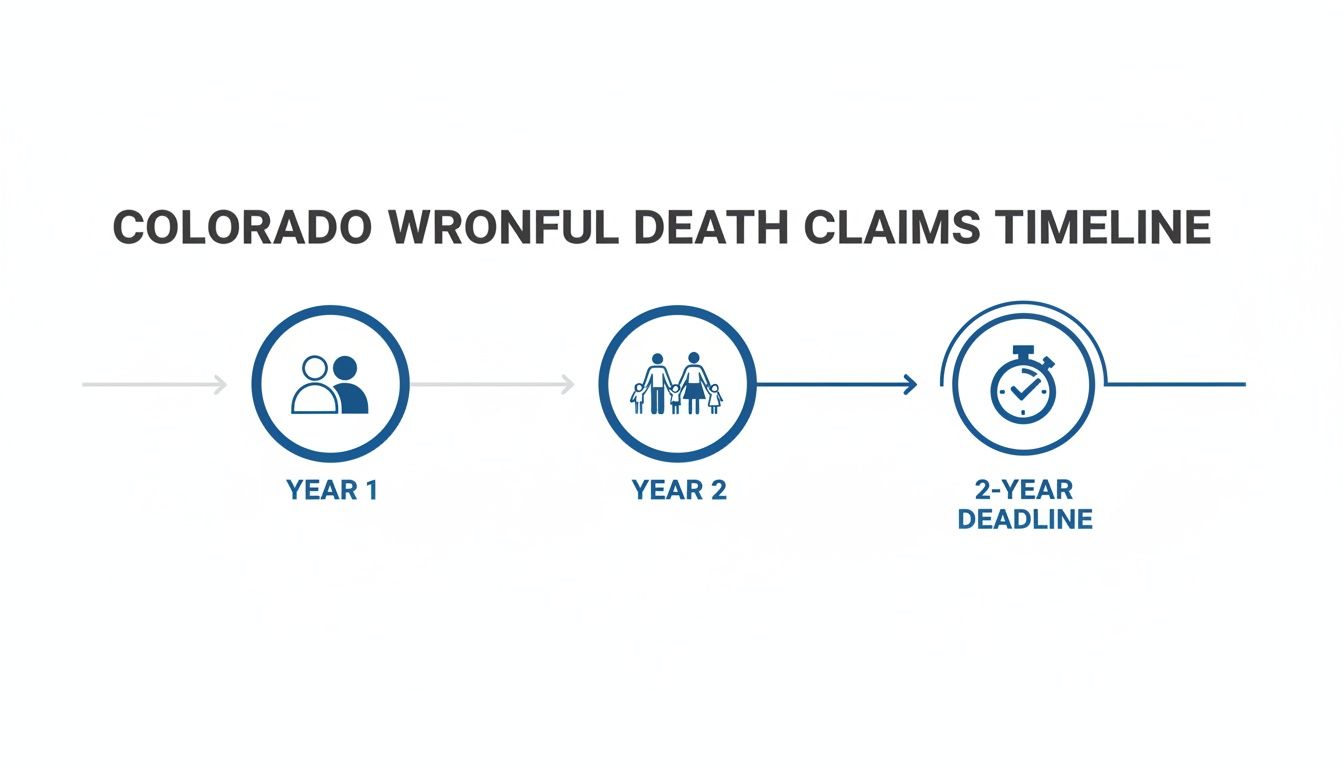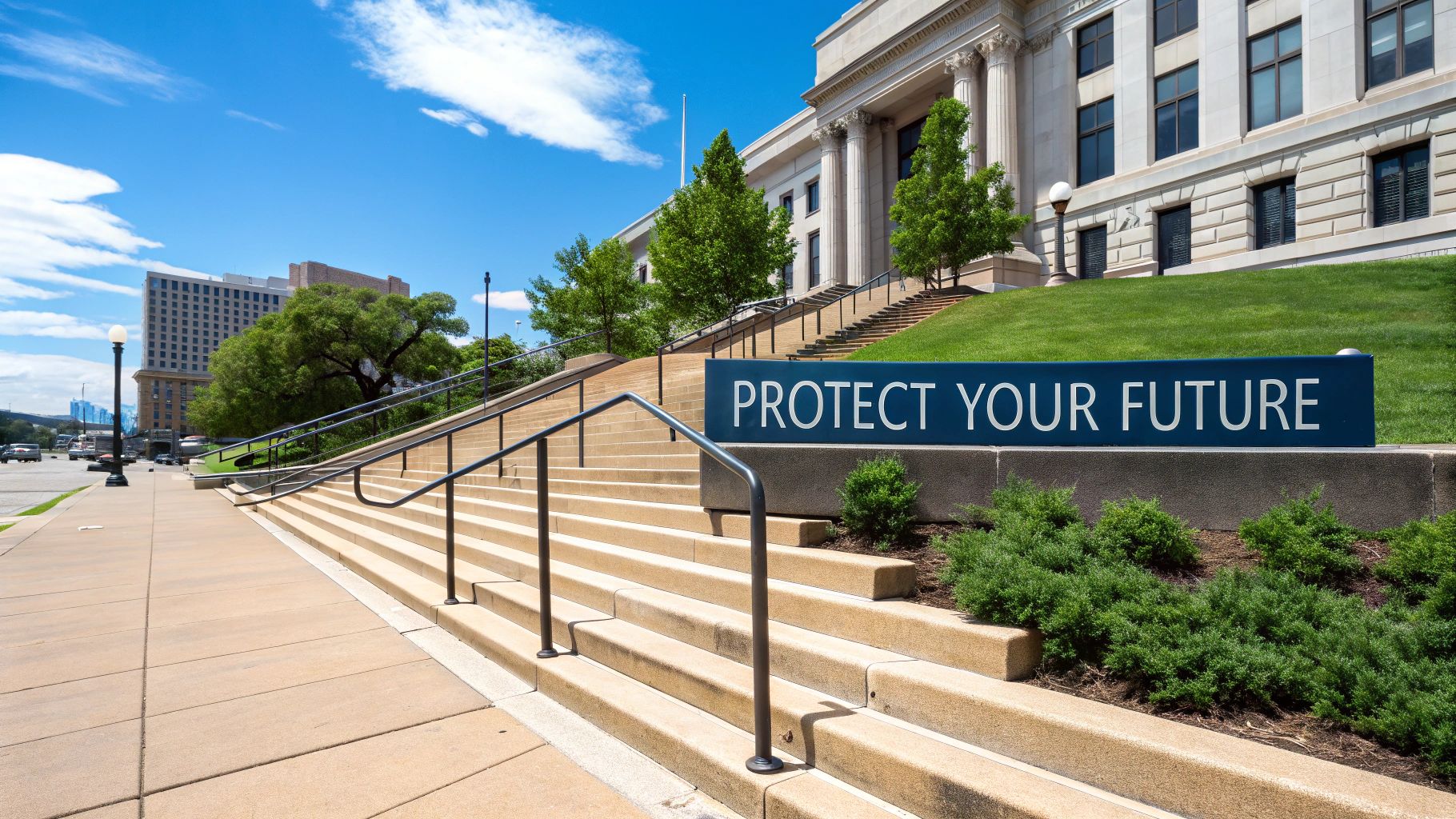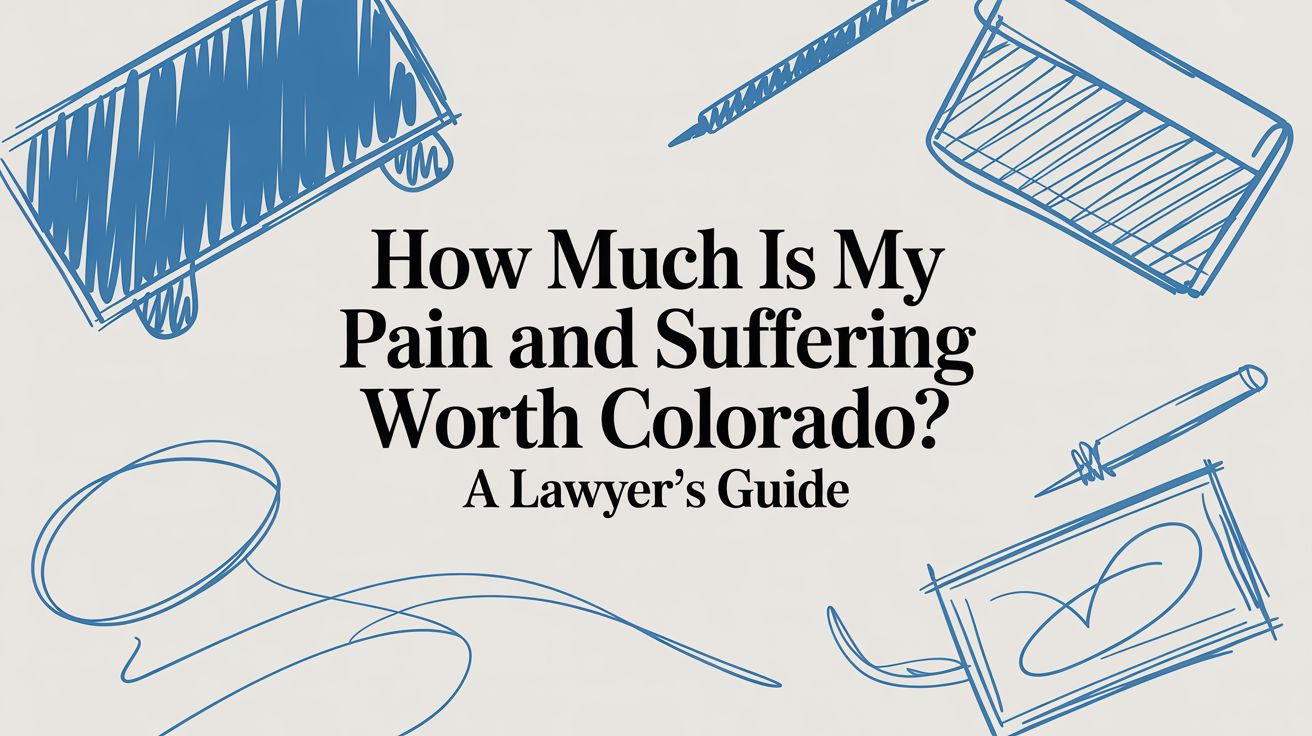Table of Contents
The call comes. And in a single, gut-wrenching moment, the world you knew is gone—replaced by a silence so heavy it feels like you're drowning. When you lose someone you love, the world stops spinning.
But when that loss was preventable—when it was caused by the reckless, stupid, or cruel actions of someone else—grief gets tangled up with a raw, burning injustice. This isn't just a tragedy anymore. It's an outrage.
A real wrongful death attorney in Denver knows this. They understand that a family's fight for justice requires more than just legal paperwork—it demands a combination of aggressive litigation and a deep, sensitive understanding of the complex Colorado laws that dictate who can file a claim, when they can file it, and how much they can recover. This fight isn't for the faint of heart. It’s for the furious.
Your Grief is a Tragedy—Their Response is a Tactic

There’s no instruction manual for this kind of pain. One minute, life is whole. The next, it’s a crater—a violent, sudden absence left by a drunk driver, a negligent corporation, or a careless property owner.
Your private catastrophe has just been shoved into a public legal system. And you can bet the insurance company on the other side is already treating your family’s loss like a math problem—a line item on a balance sheet they need to minimize, and fast.
They will sound polite. They will seem sympathetic. Their job is to pay you as little as humanly possible. That’s the beginning and the end of their strategy.
This is where we come in. Our mission is twofold: we take on the immense legal and procedural burdens so you don’t have to, and we channel our quiet fury at the injustice you’ve suffered into a relentless, strategic fight for the maximum compensation Colorado law allows. We combine aggressive litigation with sensitive, expert guidance on the strict Colorado laws that govern who can file a claim—and how much can be recovered. Let us carry this fight for you.
We understand that grieving families face incredible strain, and learning how to build resilience through immense pressure is a crucial part of navigating this impossible journey.
You Must Follow the Law's Hierarchical Map—Or Your Claim is Barred Forever
After losing a loved one, time feels like it's standing still. But in the cold, unforgiving eyes of Colorado law, a clock starts ticking—loudly. The state has drawn a very specific, time-sensitive map dictating who can seek justice.
Think of it less as a rule and more as a crucial legal map—a statutory hierarchy. Misinterpreting this map, even by a single day, can slam the courthouse doors shut on your family forever. This isn't a suggestion; it's a procedural minefield.
The Two-Year Countdown: A Deadline with Two Phases
The law generally gives you two years from the date of your loved one’s death to file a wrongful death lawsuit. This is the statute of limitations. It’s an absolute deadline, but those two years are not created equal. They’re divided into two distinct phases.
Phase 1: The First Year (The Spouse’s Exclusive Right)
For the first 12 months after a death, Colorado law gives the surviving spouse—and only the surviving spouse—the exclusive right to file a wrongful death lawsuit.
No one else can step in. Not the kids, not the parents. This is the spouse’s sole window to act on behalf of the family. If the spouse doesn't act within that first year, the legal landscape changes—dramatically.
Phase 2: The Second Year (The Field Opens Up)
Once 366 days have passed, the exclusive right held by the spouse expires. The right to file a claim then opens up to a wider group. During this second year, the following individuals gain the independent right to file:
- The Surviving Spouse (who still retains their right)
- Lineal Heirs (children and/or grandchildren)
- A Designated Beneficiary (if one was legally named)
After the first year, any of these parties can file a claim. You can find more details in our complete guide on who can file a wrongful death claim in Colorado.
No Spouse/Heirs? The Right Passes to the Parents.
What if the person who died was unmarried and had no children? The law has a clear answer. If there is no surviving spouse, no lineal heirs, and no designated beneficiary, the right to file passes to the parents of the deceased.
An experienced wrongful death attorney in Denver knows this map by heart. We ensure your claim is filed by the correct person at the correct time—because misinterpreting these foundational rules is not an option. Managing a loved one's estate often involves broader issues, and getting a handle on topics like understanding trustee responsibilities after death can provide important context.
The Trick Insurance Companies Don’t Want You to Know

It will happen sooner than you think. The phone will ring, and on the other end will be a voice dripping with practiced sympathy. It’s an insurance adjuster. They’ll say all the right things, offer condolences, and tell you they just want to "understand what happened."
Don’t be fooled. This isn’t kindness; it's the opening move in a calculated game designed to dismantle your wrongful death claim before it even gets off the ground.
Insurance adjusters are professional risk managers whose entire job is to pay your family as little as possible. They see your grief not as a human tragedy, but as a window of opportunity. Here's what they do:
- The Recorded Statement Trap: They ask for a recorded statement to "get your side of the story." In reality, it’s a legal minefield designed to get you to say anything they can twist to devalue your claim.
- The Lightning-Fast Lowball Offer: An offer arrives quickly, designed to feel like a lifeline when you're drowning. It is almost always a tiny fraction of what your claim is actually worth.
- The War of Attrition: They use procedural roadblocks and frustrating delays to grind you down until you accept their insulting offer just to make it all stop. You can learn more about these strategies in our article detailing common reasons why insurance companies deny claims.
But their single most damaging tactic is preying on a family's lack of knowledge about the true value of their claim. They count on you not knowing the law.
Their single most damaging tactic is preying on a family's lack of knowledge about the true value of their claim. They count on you not having an expert in your corner to call them out on their nonsense. Hiring an attorney immediately levels the playing field—and we speak their language.
We Don't Just Get Compensation—We Maximize It Strategically
Trying to put a dollar figure on the loss of a family member feels cold and insulting. But in the world of civil justice, it's the only tool we have to hold a negligent party accountable and secure your family's future.
As your wrongful death attorney in Denver, our job is to be relentless in fighting for every single dollar you are owed. We don't just add up the bills—we build a powerful, comprehensive case for the full value of your loss.
Economic Damages—The Uncapped Foundation
First, we go after the tangible, calculable losses called economic damages. In Colorado, these are not capped. We pursue the full, documented value of:
- Lost financial support and future earnings
- Medical bills from the injury to the time of death
- Funeral and burial expenses
These damages form the financial bedrock of your claim. But they don't even begin to tell the whole story.
The New Frontier: Leveraging the $2.125 Million Cap on Non-Economic Damages
The deepest wounds are the ones that never show up on a receipt—grief, sorrow, the loss of companionship. These are non-economic damages. For years, Colorado's cap on these damages was painfully low.
Not anymore.
For lawsuits filed on or after January 1, 2025, the cap on non-economic damages skyrockets to a staggering $2.125 million. This is a seismic shift. Our firm is strategically timing our lawsuits—if a death occurred in 2024, we will file the lawsuit after January 1, 2025, to ensure our clients can access this new, much higher cap. It’s a simple move that could mean over a million dollars more for your family. You can get more details on what this law means for families.
Justice Through Accountability: Aggressively Pursuing Punitive Damages
Sometimes, a death is caused by conduct so reckless it shocks the conscience—like a repeat DUI offender. In these cases, we don’t just seek compensation. We seek to punish.
We aggressively file motions to seek exemplary/punitive damages. This money isn't meant to compensate you. It is designed entirely to punish the defendant for their outrageous conduct.
This dramatically increases pressure on the insurance company and can substantially boost the final settlement value. It sends a clear message: their reckless behavior has a heavy price.
You Need a Lawyer Who Masters Denver's Unique Court System

Winning a settlement isn't the end of the road. Those funds have to be legally distributed among all eligible family members—a process requiring deep knowledge of Denver’s specific court procedures.
Finalizing a wrongful death settlement in Denver often means navigating two separate legal venues:
- The Denver District Court (2nd Judicial District): This is where your lawsuit is fought and the final settlement is approved.
- The Denver Probate Court: This is where the distribution of the money gets court approval. Its job is to ensure the funds are divided fairly according to Colorado law.
A wrongful death attorney in Denver who isn’t intimately familiar with both systems can cause major delays. We aren't.
Protecting the Next Generation with Conservatorships
When a minor child is an heir, the Denver Probate Court requires the creation of a conservatorship to protect their inheritance until they become an adult.
A conservatorship is a legal tool where a responsible adult is appointed by the court to manage the child's inheritance until they turn 18. This is a formal, court-monitored process—and we handle it from start to finish. We set up the necessary legal structures to satisfy the court, protecting the child’s future while minimizing the burden on your family. Looking at local case results on Donaldson Law's website can offer context on how these cases resolve.
We meticulously document every loss, from future wages to the profound, non-economic toll this has taken on your family. This aggressive preparation gives us the leverage to push past the lowball offers insurance companies love to make. For a deeper dive into these numbers, check out our guide on typical wrongful death settlement amounts in Colorado.
This is not a journey you should walk alone. When you’re ready, we’re here.
This blog post is for informational purposes only and does not constitute legal advice. The information provided herein is not intended to create, and receipt of it does not constitute, an attorney-client relationship. You should consult with an attorney for advice regarding your individual situation.
Written by
Conduit Law
Personal injury attorney at Conduit Law, dedicated to helping Colorado accident victims get the compensation they deserve.
Learn more about our team



